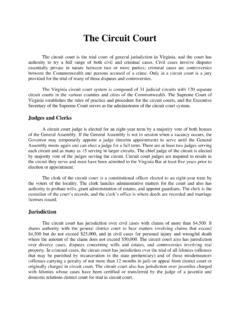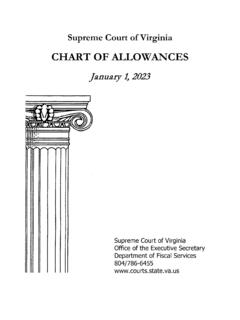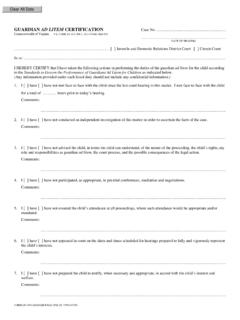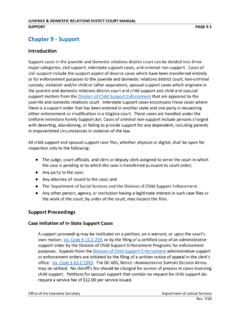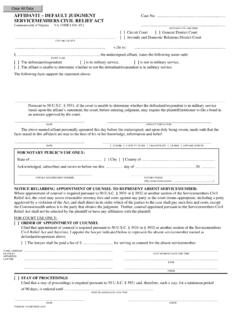Transcription of Virginia Courts In Brief
1 Virginia Courts in Brief Virginia 's Judicial System The mission of Virginia 's Judicial System is to assure that disputes are resolved justly, promptly, and economically. The components necessary to discharge this function are a court system unified in its structure and administration; competent, honest judges and court personnel; and uniform rules of practice and procedure. This pamphlet is offered to promote a better understanding of the operation of the Virginia court system and the manner in which its mission is accomplished. The present system consists of four levels of Courts : the Supreme court , the court of Appeals, the circuit Courts , and the district Courts . In addition, magistrates serve as judicial officers with authority to issue various types of processes. The Courts are organized into 31 judicial circuits and 32 similar judicial districts.
2 More than 2,600 people, including judges, clerks, and magistrates, work within the judicial branch of government with the goal of providing the citizens of the Commonwealth prompt, efficient service. MagistratesIn many instances, a citizen's first contact with Virginia s Judicial System is with a magistrate. A principal function of a magistrate is to provide an independent, unbiased review of complaints of criminal conduct brought by law enforcement or the general public. Magistrate duties include issuing various types of processes such as arrest warrants, summonses, search warrants, emergency protective orders, emergency custody orders, and certain civil warrants. Magistrates also conduct bail hearings in instances in which an individual is arrested to determine under what conditions the arrestee should be released from custody prior to trial. Magistrates provide services on an around-the-clock basis, conducting hearings in person or through the use of videoconferencing systems.
3 The Office of the Executive Secretary of the Supreme court of Virginia provides administrative supervision of and training to magistrates. The magistrate system for the Commonwealth is divided into eight regions, and each magistrate is authorized to exercise his or her powers throughout the magisterial region to which he or she is appointed. Each region has between three and five judicial districts. Each region has a magistrate regional supervisor who assists the Director of Magistrate Services in administering the statewide system. There are magistrate offices located throughout Virginia , including at least one in each of Virginia s 32 judicial districts. Chief magistrates assist in the training and supervision of magistrates within each district. District Courts Virginia 's unified district court system consists of the general district and the juvenile and domestic relations district Courts .
4 Within the 32 districts of the state, there are general district Courts and juvenile and domestic relations district Courts in every city and county. The General District court hears all criminal cases involving misdemeanors under state law and offenses that are violations of ordinances and laws of the county or city where the court is located. A misdemeanor is any charge that carries a penalty of up to one year in jail or a fine of up to $2,500, or both. The Code of Virginia defines criminal offenses and sets penalties. For many offenses, the penalty described is a fine. Fines collected for violations are paid into the treasury of the city, town, or county whose ordinance has been violated, or into the state treasury for a violation of state law. The district Courts do not conduct jury trials. All cases are heard by a judge. Each defendant in a criminal case is presumed innocent until proven guilty beyond a reasonable doubt.
5 Upon consideration of evidence, the judge decides the question of guilt or innocence and on a finding of guilt determines which penalty, if any, is proper and lawful. The general district court decides civil cases in which the amount in question does not exceed $25,000, except for personal injury and wrongful death cases in which the amount in question does not exceed $50,000. Civil cases vary from suits for damages sustained in automobile accidents to suits by creditors to receive payment on past due debts. In Virginia , claims for $4,500 or less can be initiated only in general district Courts . A separate small claims division has jurisdiction over civil actions when the amount claimed does not exceed $5,000. The general district court also hears cases in which a person is charged with a traffic infraction. If convicted of certain traffic violations, the Virginia Department of Motor Vehicles will assess points against the person's driver's license.
6 This is in addition to any fine imposed by the judge. The general district court holds preliminary hearings in felony cases, which are cases involving offenses that may be punishable by imprisonment of more than one year. At a preliminary hearing, the court determines whether there is sufficient evidence to justify holding the defendant for a grand jury hearing. The grand jury determines whether the accused will be indicted and held for trial in the circuit court . The Juvenile and Domestic Relations District court in Virginia handles cases involving: children accused of delinquent acts, traffic violations or status offenses children in need of services or supervision children who have been subjected to abuse or neglect, or abandoned children whose custody, visitation, support, or parentage is before the court children in foster care and former foster youth in the Fostering Futures Program children for whom relief of custody or termination of parental rights is sought children seeking emancipation or work permits children whose eligibility for federal or state benefits requires certain findings by the court family or household members who have been subjected to or accused of abuse adults accused of child abuse or neglect.
7 Or of offenses against a family or household member spouses seeking support after separation enforcement of support orders court -ordered rehabilitation services court consent for certain medical and mental health treatments court -ordered blood testing of minorsIn Virginia , a child is any person under the age of 18. A child is adjudicated delinquent when a court finds that the child has committed an act that would be a crime if committed by an adult. A status offender is a child who has committed a certain action that, if committed by an adult, would not be considered a criminal offense - such as a curfew violation. A child in need of supervision is one who habitually and unjustifiably is absent from school or runs away from home. A child in need of services needs treatment, rehabilitation or services to keep the child or his family safe, and the intervention of the court is required.
8 Child abuse and neglect cases involve the improper care or injurious treatment of children. Juvenile and domestic relations district Courts differ from other Courts in their duty to protect the confidentiality and privacy of children and their families who have legal matters before the court . In addition to protecting the public and holding delinquent children accountable, the court considers services needed to provide for rehabilitation. As a district court , this court does not conduct jury trials. As with the general district Courts , all parties subject to a juvenile and domestic relations district court order or judgment may appeal the decision to the circuit court . Appeals must be noted in writing with the clerk within 10 days of the court 's decision. Cases appealed to the circuit court are reheard de novo (as completely new cases). Circuit Courts The only trial court of general jurisdiction in Virginia is the circuit court .
9 The Circuit court has jurisdiction over the following: Civil Actions: shared jurisdiction with general district Courts of monetary claims of more than $4,500 butnot exceeding $25,000 and claims not exceeding $50,000 in personal injury and wrongfuldeath cases exclusive original jurisdiction of most monetary claims exceeding $25,000 attachments validity of a county or municipal ordinance or corporate bylaw divorce proceedings wills, trusts and estate matters property disputes adoption proceedingsCriminal Cases: all felonies, which are offenses that may be punished by imprisonment of more than one year misdemeanor offenses that were appealed from district court or originated from a grand juryindictment transfer or certification of felony offenses committed by juvenilesAppeals: appeals from the general district court or juvenile and domestic relations district court (heard denovo) appeals from administrative agenciesThe circuit court also handles any case for which jurisdiction is not specified in the Code of Virginia .
10 At the beginning of eac h term of the circuit court a grand jury is convened. These juries consider bills of indictment to determine whether there is sufficient probable cause to believe that a person accused of having committed a serious crime did commit such crime and should stand trial. The grand jury does not hear both sides of the case and does not determine the guilt or innocence of the accused. A special grand jury may be convened to investigate any condition that tends to promote criminal activity in the community or indicates malfeasance by governmental agencies or officials. This grand jury has subpoena powers and may summon persons, documents, or records needed in its investigation. court of Appeals The court of Appeals of Virginia provides appellate review of circuit court decisions in civil, criminal, and administrative agency cases, and final decisions of the Virginia Workers Compensation Commission.


